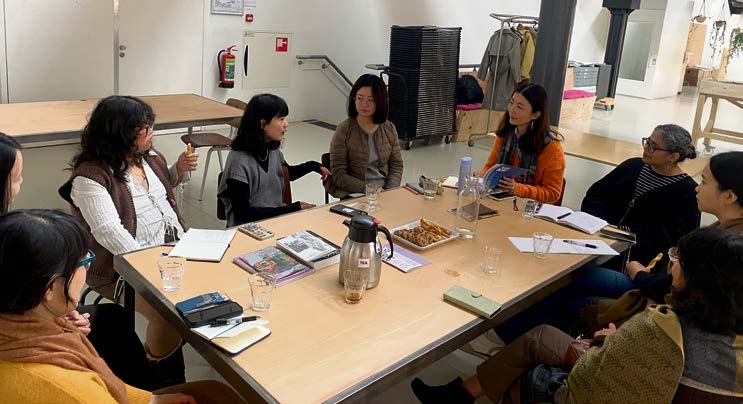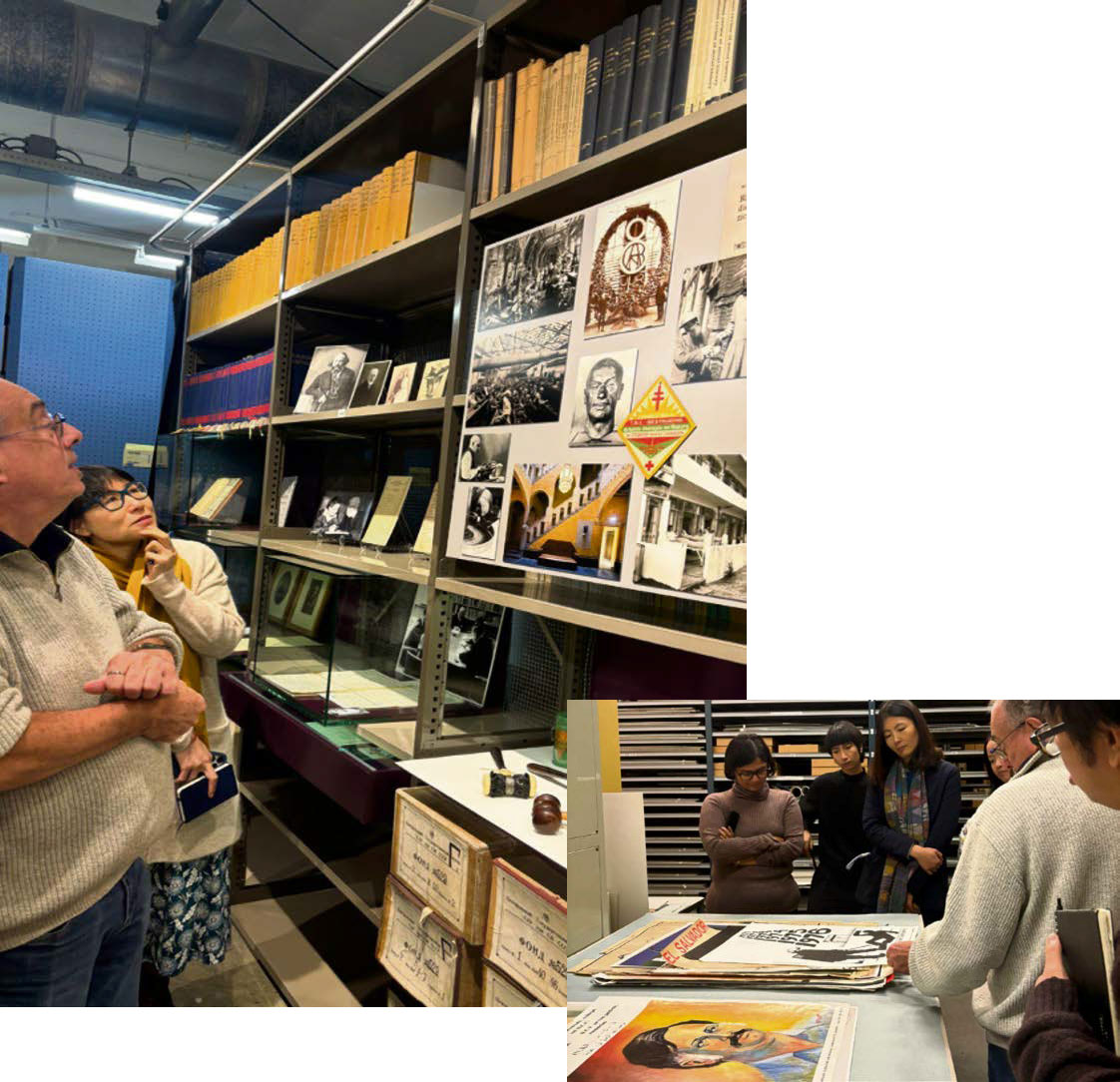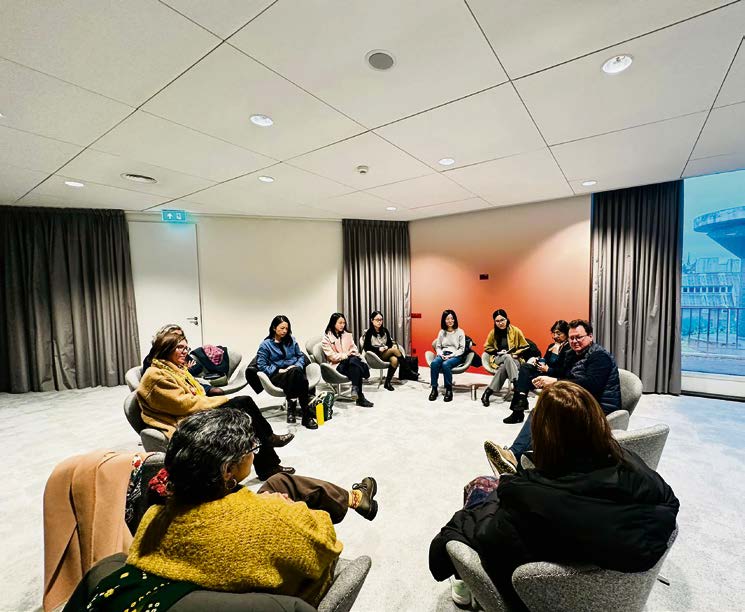Cultivating Knowledge and Connections: Reflections from IIAS Fellows
During our fellowship at the International Institute for Asian Studies, we had the opportunity to engage in a range of activities aimed at enhancing our academic paths, fostering collaboration, and promoting personal growth. In this reflection, we revisit some of these memorable activities and experiences, including visits to three partner institutions of the IIAS Fellowship Programme.

Fig. 1: IIAS fellows visit Framer Framed in Amsterdam. (Photo courtesy of Laura Erber, 2024)
Alternative Encounters at Framer Framed, Amsterdam
By Ming Luo and Zhengfeng Wang
Our visit to Framer Framed in October 2024 was an inspiring encounter with an alternative model of knowledge production and artistic engagement. Retaining its spirit of movement and transformation, this canal-side art gallery and platform for ‘contemporary art, visual culture, and critical theory and practice’ took us to the industrial wasteland of Amsterdam Oost.
The space, with its brick facade and metalwork roof structure, provides ample room for artists while embodying a sense of openness. We explored the exhibition on citizenship in Somaliland, the Somali region. Rather than being confined by rigid walls, the curation used fabric to guide visitor flow, creating a sense of framing and enclosure while maintaining fluidity. This dynamic approach resonates with Framer Framed’s broader mission: to serve as a platform where knowledge, culture, and people continuously connect and evolve. Emily Shin-Jie Lee from Framer Framed walked us through past publications and shared insights into how the institute fosters artistic practices, critical thought, and community engagement. Experiencing the energy that fuels all the meaningful work at this remarkable institute made it clear that ‘nomadicity’ not just describes Framer Framed’s history but also its approach to art, knowledge, and community.

Fig. 2-3: IIAS fellows explore the International Institute of Social History (IISG) in Amsterdam. (Photos courtesy of IIAS, 2024)
Treasures at the International Institute for Social History (IISG), Amsterdam
By My Hang Thi Bui and Xiaomei Zhao
In late November 2024, our fellow cohort visited the International Institute of Social History (IISG) in Amsterdam, where we were introduced to its treasure trove of collections through a tour given by the brilliant Eef Vermeij, Curator of Asian Collections at IISG. Eef guided us through multiple layers of the historical building of IISG, home to global archives on labor and social movements. As an avant-garde archival institute, IISG offers a diverse range of materials, including written works, audio and video footage, and objects that bear witness to significant social movements around the world. We were particularly struck by the poster collection; for example, there was an original Vietnamese poster promoting a contest on the history of Thăng Long – Hà Nôi, commemorating the city’s 990th anniversary in 2000. Another highlight was the renowned (and somewhat controversial) Dutch political poster featuring a naked woman and a curious cow, created for the 1971 Dutch parliamentary elections. These archival materials, as well as thematic exhibitions curated and displayed at the institute, are all accessible to the general public. It was truly incredible to see such a rich collection of global history at this corner of Amsterdam’s Cruquius Island.

Fig. 4: IIAS fellows visit the Käte Hamburger Centre for Apocalyptic and Post-Apocalyptic Studies (CAPAS) at the University of Heidelberg. (Photo courtesy of IIAS, 2024)
The Käte Hamburger Center for Apocalyptic and Post-Apocalyptic Studies (CAPAS), Heidelberg, Germany
By Meera Venkatachalam and Sandra Sattler
From 4 December to 7 December 2024, IIAS fellows visited the Käte Hamburger Centre for Apocalyptic and Post-Apocalyptic Studies (CAPAS) at the University of Heidelberg.
Over two days, during a series of informal workshops and meetings, we met with the Director of the Centre, Prof. Dr. Robert Folger, and a number of the fellows. The Centre boasts diverse expertise in various disciplines, from Media Studies to Anthropology and History, and we met fellows from Germany, the United Kingdom, Colombia, Brazil, and Thailand. The Käte Hamburger fellows were very interested in the work of IIAS and eager to learn more about our unique approach to Asian Studies, which they then tried to apply to their programs. The Director also shared valuable insights on applying for and securing funding in the German higher education system.
The other highlight of our trip to Heidelberg was the lively Christmas market – we enjoyed the lights and energy and most of all, the glühwein!

Fig. 5: IIAS fellows gather for film screenings and group discussions. (Photo courtesy of Ling Zhang, 2024)
Film Sessions in Leiden
By Sarah Niazi and Ling Zhang
At IIAS, we embrace a vibrant culture of film screenings and discussions, spanning diverse themes, genres, and styles – from fiction to documentaries – featuring works from Asia, Africa, Europe, and Latin America.
Apart from our regular Friday film screenings, where fellows share a film that reflects their research interests and disciplinary backgrounds, since February 2025, we have been organizing a series of films on themes related to Higher Education. These films have sparked transregional and interdisciplinary dialogues on knowledge production amid academic precarity and shifting social landscapes. We have also hosted public screenings with filmmakers in attendance, such as Chinese documentarian Fan Jian’s After the Rain (2021), fostering dynamic exchanges through Q&A sessions with engaged audiences. These film events embody our commitment to outreach and social engagement, extending the intellectual conversations beyond IIAS.